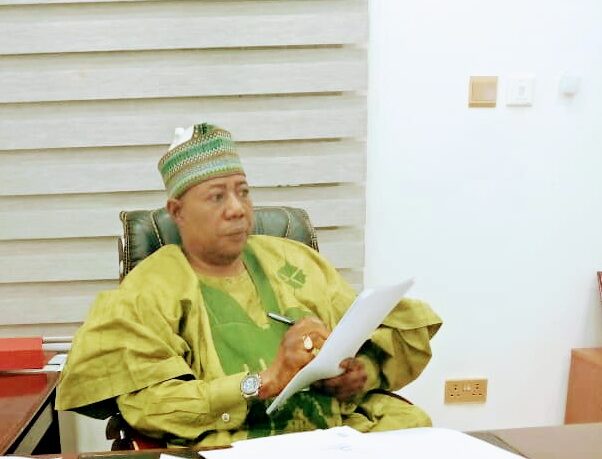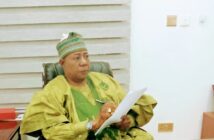In a bid to kickstart an invigorated war on corruption in line with the Renewed Hope Agenda as contained in his campaign promises to Nigerians, Bola Bola Ahmed Tinubu, on October 13, appointed a legal luminary and an anti-corruption czar, Ola Olukoyede, to oversee the war on corruption and ensure it is undertaken through a reformed institutional architecture in the anti-corruption sector. The idea is in accordance with the campaign promises of the Renewed Hope agenda, which remains the central pillar of Tinubu’s government
Since then, all hell have been let loosed. Instead of applauding the president for going extra mile to fish out a legal egg-head of 22 years standing to serve as the chairman of the Economic and Financial Crimes Commissio, (EFCC), the corrupt elements in our midst and their henchmen have employed every crooked logic to puncture holes in one of President Tinubu’s best picks.
Granted, Nigerians have been deceived many times before. Let it be known to these charlatans however that Nigerians can no longer be deceived because this is another voice of Jacob, yet the hands of Esau.” We know those fighting back through proxies. They’re merchants of corruption, who are unsettled by Tinubu’s choice of Ola Olukoyede. They know that with a legal luminary of Olukoyede’s pedigree, the Economic and Financial Crimes Commission is back to the days of diligent prosecutions. They know there’s no escape route for them. The pressure they’re piling on President Tinubu to rescind Olukoyede’s appointment is the last kicks of a dying horse.
In a desperate bid to advance their lamed arguments, they relied on section 2 (3) of the Economic and Financial Crimes Commission (Establishment) Act, 2004, which prescribes the person to Mann EFCC and empowers the president to appoint same. But because their intentions are infested with greed, pedestal consideration, they have left holes in their arguments. For instance, if not for corrupt intentions, how can anyone in his right senses says a seasoned lawyer with over 22 years experience and a regulatory compliance consultant and specialist in fraud management and corporate intelligence, with extensive experience in the operations of the EFCC, cannot pass for the chairman of the anti-corruption agency?
Besides, the Supreme Court verdict, determined in the case of Ejuetami v. Olaiya & Anor (2001) LPELR-1072 (SC) at Pg.23-24, statest: “The words used are to be given their ‘ordinary and natural sense’. Therefore, the clear, explicit and unambiguous words used in sections 2(1)(a)(i)-(iii), (p), 2(2), 3(1)-(3) and 8(5) of the EFCC Act must be given their ordinary and natural sense in line with the guidelines set by the Supreme Court in its long line of undisturbed judicial precedents”.
The Section 2(1) sub-paragraph (iii) of the EFCC Act did not state the nature of the experience which a person is required to possess.
This implies that such cognate experience is presumed to be that of the work or functions of the EFCC acquired anywhere since the EFCC Act did not state where it must be acquired. It is also unambiguous by the provisions of subparagraph (iii) that once a person possesses fifteen (15) years of such cognate (i.e., similar or alike) experience, then he has satisfied the provisions of sub-paragraph (iii) of section 2(1)(a) of the EFCC Act.
Hence, it is clear that the unambiguous provisions of the EFCC Establishment Act, 2004, that any member of the Commission, whether serving or retired who has 15 years’ cognate experience in their chosen career, are eligible to be appointed as the chairman of the Commission.
Prior to this time, the convention and precedence is that to be qualified for appointment as the executive chairman of the Commission, the nominee must be a Police Officer or someone with law enforcement background, particularly in the area of investigation. This has not only exposed the Commission to all manner of vices but has brewed internal wrangling, discontent and hatred among the Commission’s staff members.
Let me caution that it is time we move away from fiction to fact and from convention to strict adherence to the statutory provisions of the enabling Act of the Commission in our constitutional democracy.
Besides, in their agitations, they have turned blind eyes to the fact that Olukoyede was the chief of staff to the chairman of the EFCC from 2016-2018 and secretary to the Commission (2018-2020). He was a member of a law enforcement organisation as secretary, in this case the EFCC, as stipulated in the EFCC Act, and as such satisfied every legal detail to be appointed as chairman.
Needless to caution that corruption has severely challenged our socio-economic systems, which has given rise to the insecurity we are battling with today. Let us not play politics with corruption because the destiny of our country rests squarely on vigorous fight against corruption.
To appreciate the insidious nature of corruption, permit me to highlight that the United Nations estimates that globally $3.6 trillion is lost to corruption. Also, the Africa Union estimates that $140 billion is lost through corruption annually. This is equivalent to the GDP of all but five countries in Africa. To put this in another perspective, this amount can ensure uninterrupted power 24 hours a day to every citizen in Africa for three (3) years.
Although corruption is a global problem, the impact in Nigeria has far-reaching consequences on the prospects of a nation and the quality of life of every citizen. For instance, between 2018 and 2020, Nigeria lost N2.9trn to contract and procurement fraud. This sum is enough to fund the construction of at least 1,000 km of road and to build over 230 standard educational institutions, including 30 specialists hospitals of international standards.
As for ethnic champions who argue that Tinubu’s appointment is lopsided, I have this question to ask, “which do we want”? capacity, competence, character and courage to do the job, or business as usual?
These charlatans are also blinded from factoring the fact that President Tinubu, at the same time, appointed Hassan Hammajoda, the current director of Finance and Accounts of the EFCC as secretary of the Commission. Hammajoda, a public administrator with extensive experience in public finance management, holds a Bachelor of Science degree in Accounting from the University of Maiduguri and a Master’s in Business Administration from the same university. He began his career as a lecturer at the Federal Polytechnic, Mubi. He further went into banking before becoming a public servant.
Similarly, President Tinubu also appointed Musa Aliyu, a lawyer and Attorney-General of Jigawa State, as the new chairperson of the Independent Corrupt Practices and Other Related Offences Commission (ICPC).
The newly named ICPC chairman, according to presidential statement, has embarked upon many far-reaching reforms as the Attorney General of Jigawa State since September 2019 and holds Bachelors, Masters and Doctorate degrees in Law. He was also named as a Senior Advocate of Nigeria-designate in October 2023.
If you ask me, these appointments have no ethnic biases. The appointees parade impressive credentials, sterling enough for their new roles as anti-corruption czars, except for those with improper motives.
“We need to address the focus of our mandate. We should use the Commission to drive economic development. Why are we fighting crimes? It is for the system to thrive, for the economy to grow, and for the society to get better. Therefore, our focus should be geared towards developing the nation for greater benefit.
“We are going to drive professionalism in discharging our duties in line with the rule of law. The rule of law is going to be our guiding light. We are going to drive EFCC to a place where when you see EFCC personnel, you will see a touch of professionalism,” he said.
These should be the focus of discussion at this time instead of unnecessary distractions by vested interests. Be it known to them that they have failed woefully on arrival.
The issue at stake is how to stop corruption in Nigeria, which is the high-risk bride of poverty. Let me remind Nigerians of how the socialists and communists systems of leadership were able to contain corruption. They trained anti-corruption experts and acquired every technology to prosecute corruption, cracking down on the culprits no matter how wealthy and political influencial the mafias were.
With experienced legal experts in our anti-graft agencies, fuel subsidies scam, arms gate scam, COVID-19 scam, MDAS Scams and other forms of fraud and related offences will be properly prosecuted, including high profile cases pending before EFCC and ICPC. Our social safety nets are scams and President Tinubu’s Renewed Hope Agenda is set to wriggle Nigeria out of these forms of monumental corruption in our society. Corruption should be implemented in a coordinated and holistic manner. It is in this note that I welcome my brother, Olukayode, to the club of anti-corruption czars. Once again, congratulations.
Instead of engaging in these frivolous, baseless arguments and promoting primordial sentiments, I think what we should be doing now is to start interrogating Olukoyede’s road map or blueprint for a reinvigorated EFCC. As he has already stated that the agency under him will focus on the prevention of graft to save the government from spending money on prosecution.
– Ibrahim is director, Communications and Strategic Planning, of the Presidential Support Committee (PSC).



